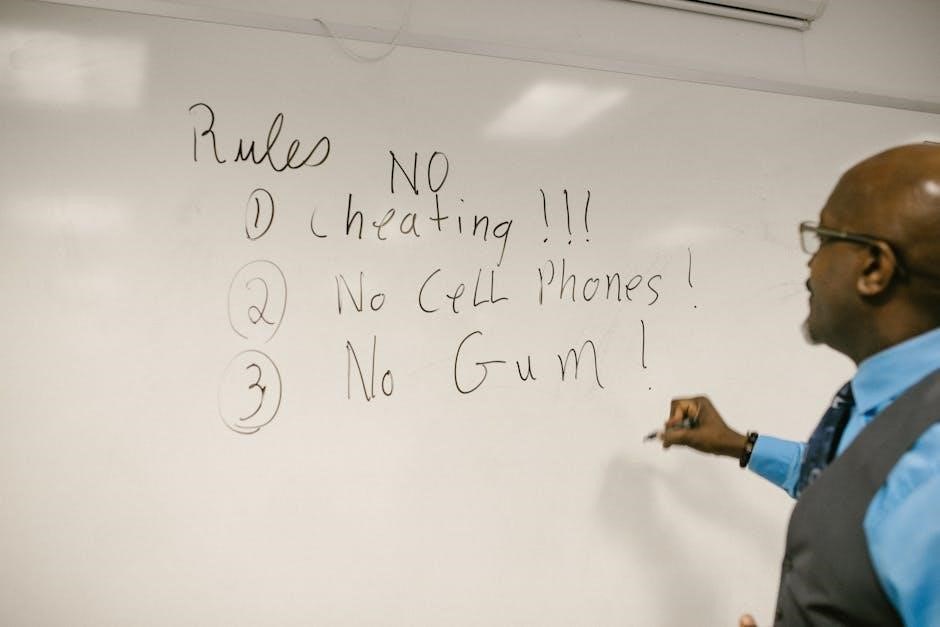
Overview of Form 3520-A
Form 3520-A is an annual information return required for U.S. persons with certain foreign trust transactions or ownership. It ensures compliance with U.S. tax laws and regulations.
Form 3520-A is an annual information return used to report certain transactions with foreign trusts. It is filed by U.S. persons who have an ownership interest in or receive distributions from a foreign trust. The form provides detailed information about the trust’s activities‚ assets‚ and distributions‚ ensuring compliance with U.S. tax laws and regulations regarding foreign trusts.
1.2 Purpose of the Form
Form 3520-A is designed to report transactions with foreign trusts‚ ensuring U.S. persons disclose all relevant activities to the IRS. Its primary purpose is to maintain transparency and prevent tax evasion by providing detailed information on the trust’s operations. Accurate reporting is crucial for assessing tax liabilities and ensuring compliance with U.S. tax laws. The form plays a key role in maintaining trust and integrity in international financial reporting‚ ensuring all activities are compliant with U.S. regulations.

Key Definitions
Key definitions essential for understanding Form 3520-A include foreign trusts and U.S. tax reporting requirements‚ ensuring accurate compliance with IRS regulations and international tax laws.
2.1 What is a Foreign Trust?
A foreign trust is a trust where the trustee is not a U.S. person‚ and its administration is governed by foreign laws. It is classified based on the residency of the trustee and the trust’s governing documents. Understanding this definition is crucial for determining reporting obligations under Form 3520-A and ensuring compliance with U.S. tax regulations regarding foreign trusts.
2.2 Understanding U.S. Tax Reporting Requirements
U.S. tax reporting requirements for foreign trusts mandate that U.S. persons disclose all transactions‚ assets‚ and activities related to the trust. This includes reporting income‚ distributions‚ and contributions‚ as well as ensuring compliance with all applicable IRS regulations. Accuracy and timeliness are crucial to avoid penalties. Failure to comply can result in severe financial consequences‚ emphasizing the importance of understanding these obligations to maintain transparency and prevent tax evasion.

Purpose and Importance of Form 3520-A
Form 3520-A is crucial for ensuring compliance with U.S. tax laws‚ promoting transparency‚ and preventing tax evasion. It ensures accurate reporting of foreign trust activities‚ maintaining accountability and enabling proper IRS oversight of international financial transactions.
3.1 Why is Form 3520-A Necessary?
Form 3520-A is necessary to ensure compliance with U.S. tax laws‚ providing transparency into foreign trust activities. It helps the IRS track income that may otherwise go unreported‚ ensuring proper taxation. By requiring detailed reporting of trust operations‚ the form prevents tax evasion and ensures U.S. persons meet their tax obligations related to foreign trusts.
3.2 Consequences of Not Filing
Failing to file Form 3520-A can result in severe penalties‚ including substantial fines and potential criminal charges. The IRS may impose civil penalties of up to $10‚000 or more for each year the form is not filed. In severe cases‚ criminal penalties‚ including fines and imprisonment‚ may apply. Additionally‚ unpaid taxes and interest may accrue‚ further increasing the financial burden.

Eligibility Criteria
U.S. persons with ownership or certain transactions involving foreign trusts must file Form 3520-A. Eligibility is based on specific criteria‚ including ownership percentages and trust activities.
4.1 Who Needs to File Form 3520-A?
U.S. persons with ownership in a foreign trust‚ including grantors‚ trustees‚ or beneficiaries‚ must file Form 3520-A. This includes those with a reportable event or transaction exceeding specific thresholds‚ such as transfers to or distributions from the trust. The filing requirement applies based on ownership percentage and the nature of the trust activities.
4.2 Exceptions and Exemptions
Certain U.S. persons may be exempt from filing Form 3520-A‚ such as governmental entities‚ tax-exempt organizations‚ or foreign trusts with no U.S. beneficiaries. Additionally‚ trusts meeting specific asset or income thresholds may not require filing. Exceptions also apply to grantor trusts treated as owned by the grantor under IRS regulations. Always consult IRS guidelines to confirm eligibility for exemptions.

Filing Requirements and Deadlines
Form 3520-A must be filed annually‚ adhering to specific deadlines and requirements set by the IRS. Timely filing is crucial to avoid penalties and ensure compliance.
5.1 When is Form 3520-A Due?
Form 3520-A is generally due by April 15th for calendar-year taxpayers. Fiscal-year filers must submit it by the 15th day of the 4th month after their tax year ends. The IRS does not grant extensions for Form 3520-A beyond the original deadline. Timely filing is critical to avoid penalties. Ensure the form is submitted to the IRS in Ogden‚ UT‚ following the instructions carefully to meet all requirements.
5.2 Extensions and Late Filing Penalties
Form 3520-A cannot be extended beyond its original deadline. Late filing may result in a $10‚000 penalty‚ with additional penalties for continued noncompliance. The IRS may also impose penalties proportional to the gross value of trust assets. Reasonable cause for late filing may reduce penalties. Consult a tax professional to address late filings and avoid further complications. Timely compliance is essential to minimize penalties.

Step-by-Step Instructions for Completing Form 3520-A
Form 3520-A requires detailed reporting of foreign trust transactions. Gather all necessary documents‚ including trust agreements and financial records. Carefully review each section to ensure accuracy and completeness.
6.1 Gathering Necessary Information
To complete Form 3520-A‚ gather all relevant documents‚ including the trust agreement‚ financial statements‚ and records of contributions‚ distributions‚ and assets. Ensure foreign currency amounts are converted to U.S. dollars using the appropriate exchange rates. Collect identification details for the grantor‚ trustee‚ and beneficiaries. Organize all information to accurately report transactions and meet IRS requirements.
6.2 Completing Each Section of the Form
Complete each section of Form 3520-A carefully‚ ensuring accuracy. Start with Part I for trust information‚ then proceed to Part II for income statements. Itemize assets‚ liabilities‚ and distributions‚ and report contributions in Part III. Follow IRS instructions for each field‚ ensuring proper classification and valuation. Double-check calculations‚ especially foreign currency conversions‚ to avoid errors.

Common Challenges and Mistakes
Common challenges include misclassification of assets‚ incorrect valuation‚ and errors in reporting distributions or contributions. Complexity in navigating U.S. tax laws often leads to mistakes and delays.
7.1 Avoiding Errors in Reporting
To avoid errors‚ ensure accuracy in reporting trust details‚ asset valuations‚ and transactions. Misclassification of assets or incorrect U.S. person status can lead to issues. Verify all information thoroughly‚ and seek professional guidance to interpret complex definitions. Properly document all foreign trust activities and ensure timely reporting of distributions and contributions. Attention to detail is crucial to prevent costly mistakes and ensure compliance with IRS requirements.
- Double-check trust identification and ownership details.
- Ensure accurate valuation of assets and income reporting.
- Understand definitions of foreign trust and U.S. person status.
7.2 How to Correct a Mistake
If errors are discovered after filing‚ correct them by submitting an amended Form 3520-A. Identify the specific mistake‚ revise the form‚ and attach a detailed explanation. File the corrected form with the IRS and ensure it reflects the accurate information. If additional forms are impacted‚ such as Form 3520‚ amend those as well. Timely corrections can mitigate penalties and ensure compliance with tax obligations.
- Identify and document the error clearly.
- Submit an amended Form 3520-A with corrections.
- Attach a detailed explanation of the changes made.

Penalties for Non-Compliance
Failure to file or inaccuracies on Form 3520-A can result in significant civil penalties‚ potentially up to $10‚000 or more for late or incorrect submissions.
8.1 Civil Penalties for Late or Inaccurate Filing
The IRS imposes civil penalties for late or inaccurate filing of Form 3520-A. A $10‚000 penalty may apply for each year the form is late or incomplete. This amount increases annually for inflation. Additional penalties may be assessed for underreported income or overvalued assets. Reasonable cause for errors can sometimes lead to penalty abatement‚ but timely corrections are essential to mitigate fines;
8.2 Criminal Penalties in Severe Cases
In severe cases of non-compliance‚ criminal penalties may apply. Willful failure to file Form 3520-A or intentional evasion of U.S. tax obligations can result in criminal charges. Fines and imprisonment are possible‚ with penalties increasing based on the severity of the offense. The IRS may pursue criminal prosecution for fraudulent activity or deliberate disregard of filing requirements‚ emphasizing the importance of accurate and timely compliance with foreign trust reporting obligations.

Reporting Requirements
Form 3520-A requires annual reporting to the IRS‚ detailing foreign trust assets‚ transactions‚ and distributions. Accurate disclosure is crucial to avoid penalties and ensure compliance with U.S. tax laws.
9.1 Disclosure of Foreign Trust Assets
Form 3520-A requires detailed disclosure of foreign trust assets‚ including their fair market value and ownership percentages. U.S. persons must report all trust assets held during the tax year‚ specifying the type of assets and their locations. Accurate valuation and proper classification are essential to meet IRS reporting standards and avoid penalties for incomplete or inaccurate disclosures.
9.2 Reporting Distributions and Contributions
Form 3520-A requires reporting all distributions from and contributions to a foreign trust. Distributions must include the amount‚ date‚ and recipient details‚ while contributions must specify the contributor and amount. Accurate reporting of these transactions is crucial for compliance‚ as errors may lead to penalties. Proper documentation ensures transparency and satisfies IRS requirements for foreign trust activities.

Best Practices for Filing Form 3520-A
Best practices include consulting a tax professional‚ organizing records‚ ensuring accuracy‚ and timely submission to avoid penalties and ensure compliance with IRS foreign trust reporting requirements.
10.1 Consulting a Tax Professional
Consulting a tax professional is crucial for accurately completing Form 3520-A‚ as they provide expertise in foreign trust laws‚ ensuring compliance and minimizing errors. Their guidance helps navigate complex reporting requirements‚ such as disclosing assets and reporting distributions‚ while avoiding penalties. Professionals can also address unique situations‚ such as contributions or ownership changes‚ ensuring all obligations are met efficiently and correctly for current and future filings.
10.2 Organizing Records for Future Filings
Organizing records is essential for efficient and accurate future filings of Form 3520-A. Maintain detailed documentation‚ including trust agreements‚ transaction records‚ and asset valuations. Store contributions‚ distributions‚ and ownership changes in a centralized‚ accessible location. Regularly review and update records to ensure accuracy. Implement a secure storage system‚ either physical or digital‚ to safeguard sensitive information and facilitate compliance with future reporting requirements.
Form 3520-A is crucial for U.S. persons with foreign trust interests‚ ensuring compliance and accurate reporting. Careful preparation and timely filing are essential to avoid penalties and ensure adherence to IRS requirements.
11.1 Final Thoughts on Form 3520-A Compliance
Form 3520-A compliance is critical for U.S. persons with foreign trust interests. Accurate reporting and timely filing are essential to avoid penalties and ensure adherence to IRS regulations. Consulting a tax professional can help navigate complexities and prevent errors. Proper record-keeping and understanding of the form’s requirements are key to maintaining compliance and avoiding costly consequences. Proactive attention ensures peace of mind and financial security.
